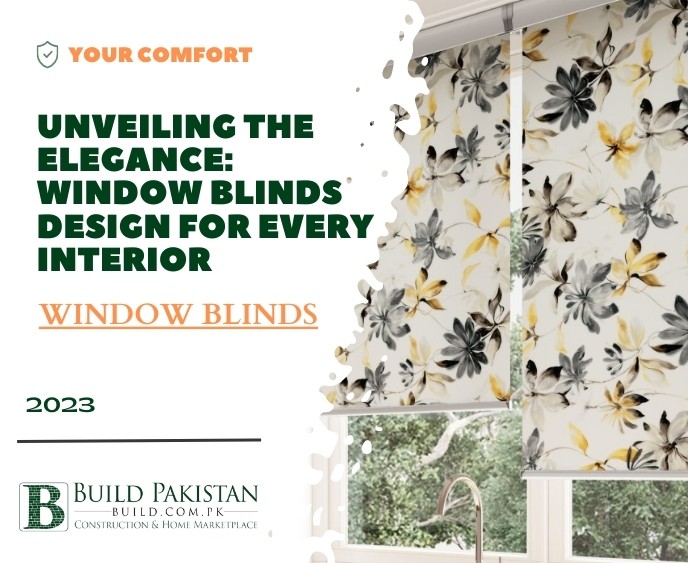Unveiling the Elegance: Window Blinds Design for Every Interior

Introduction:
Windows are the eyes of a home, offering
glimpses of the outside world and welcoming natural light. To enhance their
functionality and aesthetics, window blinds have emerged as an essential
element of interior design. This comprehensive exploration delves into the
captivating world of window blinds design, unraveling the significance of
window treatments, the spectrum of designs available their applications, and
the transformative impact they have on the ambiance and style of interiors.
The Significance of Window Blinds in Design:
Window blinds
are not just functional coverings; they are design elements that play a pivotal
role in enhancing privacy, controlling light, and contributing to the overall
aesthetics of a space.
Understanding Window Blinds Design:
Window blinds come in a
variety of designs, materials, and styles.They are versatile window coverings
that offer both practical benefits and opportunities for creative expression.

Exploring the Spectrum of Window Blinds Designs
Vertical Blinds:
Vertical blinds are characterized by slats
that run vertically. They are ideal for larger windows and sliding doors,
offering excellent light control.
Horizontal Blinds:
Horizontal blinds, also known as Venetian
blinds, have horizontal slats that can be tilted to control light and privacy.
Roller Blinds:
Roller blinds are simple and sleek, with a
single piece of fabric that can be rolled up or down. They offer a clean and
minimalist look.
Roman Blinds:
Roman blinds are made of fabric and fold up into
neat horizontal pleats when raised. They bring softness and texture to windows.
Pleated Blinds:
Pleated blinds have a honeycomb-like
structure that provides insulation and energy efficiency. They come in various
fabrics and patterns.
Wooden Blinds:
Wooden blinds bring a touch of warmth and
natural elegance to interiors. They can be stained or painted to match various
design themes.
Applications in Interiors
Living Rooms:
Window blinds design can complement the overall
style of living rooms, offering light control and privacy while adding a
decorative element.
Bedrooms:
Bedrooms benefit from blinds that provide blackout
options, ensuring a peaceful sleep environment. Design choices can also reflect
the room's theme.
Home Offices:
Blinds in home offices can enhance productivity
by controlling glare on screens and offering a comfortable working environment.
Kitchens:
Blinds in kitchens should be easy to clean and
maintain while adding a touch of style o the space.
Impact on Interior Design
Light Control and Privacy:
Window blinds design allows
homeowners to regulate the amount of natural light entering a room while
maintaining privacy.
Aesthetic Enhancement:
Blinds contribute to the overall
aesthetic of a space, offering a seamless blend of functionality and design.
Space Illusion:
The right choice of blinds can create an
illusion of height and width, making a room appear more spacious.
Personalization and Design Exploration
Material Selection:
Blinds are available in a range of
materials, including fabric, wood, metal, and synthetic materials, allowing
customization to match design preferences.
Color and Pattern:
The variety of colors and patterns
available in blinds allows homeowners to experiment with design themes and
create focal points.
Texture and Finish:
Different materials offer varying textures and finishes, allowing designers to add layers of visual interest to windows
Conclusion:
Window blinds design bridges the gap between
practicality and aesthetics, transforming windows into focal points of interior
design. By thoughtfully selecting the right type, material, and design,
homeowners and designers create spaces that balance light control, privacy, and
visual appeal. Through the art of window blinds design, interiors become a
canvas where creativity, functionalityand elegance converge, inviting
individuals to experience the transformative power of window treatments.
Whether enhancing a cozy bedroom or providing a functional touch to a modern
office, window blinds design is a testament to the synergy of form and function
that defines the heart of interior design.









